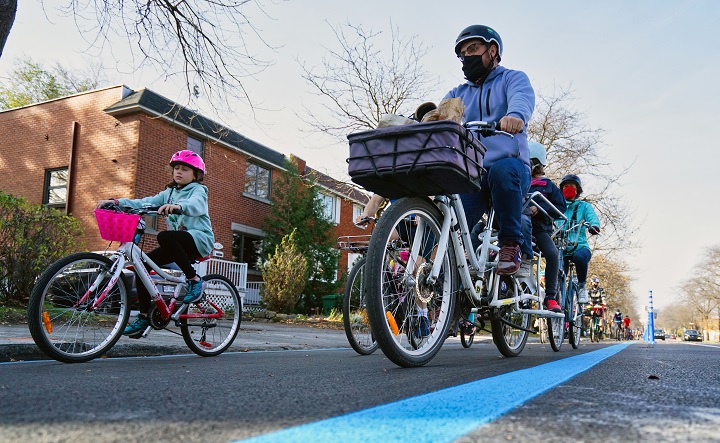Candidates in Montreal’s mayoral race are heading into the final stretch of the election campaign with voters heading to the polls this weekend.

The top two contenders — incumbent Valérie Plante and Ensemble Montréal’s Denis Coderre — have been in a dead heat for weeks, with transportation emerging as a hot-button topic.
The issue of bike paths has become especially contentious, with candidates arguing over the needs of a growing cycling network and the loss of parking spaces.
Global News spoke with experts who said they hope that whoever forms the next administration will strive to promote more active transportation.
“The future of the city is a walking city, the future of the city is a bicycling city,” said Jason Prince, an urban planner and part-time faculty member at Concordia University.
For Prince, it’s about tackling the climate emergency and moving to make Montreal carbon-neutral.
“The principal source of greenhouse gas emissions in the Montreal region is is transportation,” Prince said.
He added that for a brief period, the COVID-19 pandemic gave us a glimpse of what a carbon-neutral Montreal could look like without cars.
“You could hear the birds, the air cleared up, the people of the city went for walks,” Prince said.
He believes the city should move to consolidate telecommuting but admitted it would require reimagining what the downtown looks like if emptied of its office workers.
“Every downtown should be downtown that is full of people,” he said.
Prince estimates there are currently around 50,000 to 60,000 people living within walking distance of the downtown core, defined as the intersection of Peel and Ste-Catherine.
“Maybe we need 300,000 people living downtown,” he said, adding maybe some of the current office towers could be repurposed with the idea of making Montreal a walking city.

Kevin Mannaugh an associate professor in geography at the McGill School of Environment, said that while he agrees that walking and cycling need to be core elements of any city’s transport system, the challenges are great.
“There’s there’s a lot of resistance to cycling, to bike lanes, for example, to pedestrian projects,” he said. “There’s there’s a lot of people stuck in the mindset that the cars should be the top of the hierarchy.”
The kind of changes that need to happen aren’t about making cars harder to use but about ensuring other modes of transportation, including biking, walking and public and collective transport, are easier, safer, cost-effective and more efficient to use.
“Then, when the car is needed, that’s also an option,” Mannaugh said. “But we’ve got other options that are better for your own health, better for the environment, better for other people, and taking up less space on the streets.”
- Alberta to overhaul municipal rules to include sweeping new powers, municipal political parties
- Military judges don’t have divided loyalties, Canada’s top court rules
- Norad looking to NATO to help detect threats over the Arctic, chief says
- Grocery code: How Ottawa has tried to get Loblaw, Walmart on board
According to Mannaugh, bringing about meaningful change requires a great deal of political will. Transportation needs to be considered in the long term — as in, what it might look like in 10 or 20 years, and what investments need to be now in order to take care of that.
Yet Mannaugh argued that a short, four-year electoral cycle can lead to shortsightedness. Politicians worry about getting elected and staying in power, rather 10-year, 20-year or 30-year time frames.
Montrealers can cast their ballot this Saturday and Sunday from 9:30 a.m. to 8 p.m.




Comments